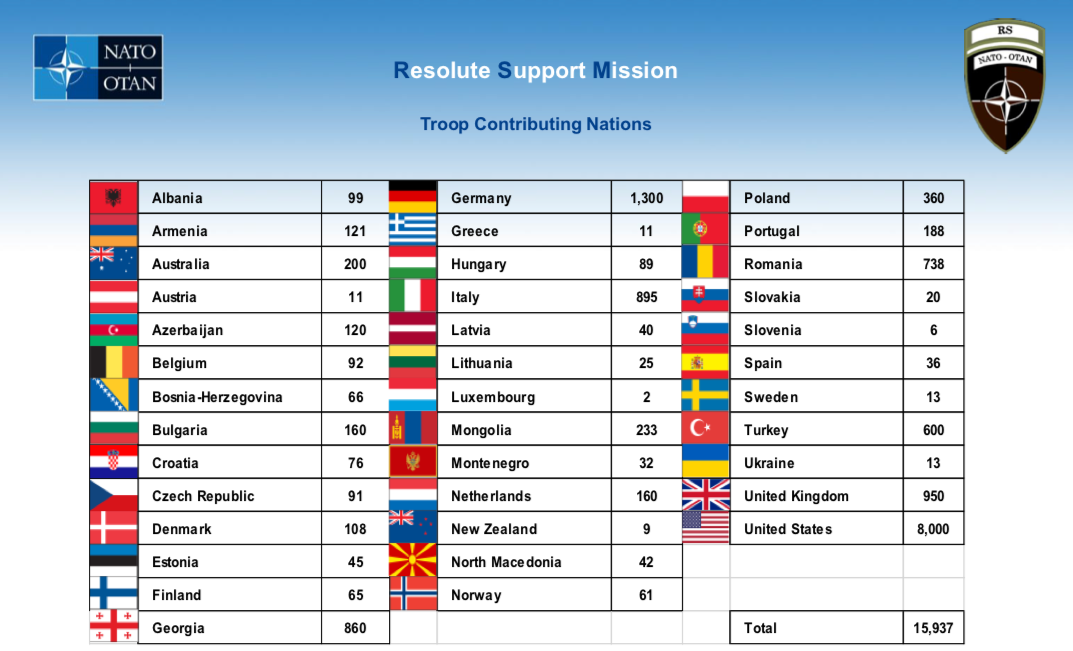
Resolute Support
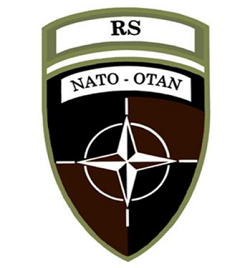
The NATO-led Resolute Support Mission was launched on January 1, 2015 following the completion of the International Security Assistance Force (ISAF) mission in Afghanistan. Resolute Support is a non-combat mission that provides training, advice and assistance to the Afghan National Defence and Security Forces (ANDSF). At the NATO Summit in Warsaw in 2016, Heads of State and Government decided to sustain the Resolute Support Mission beyond 2016.
Some 16,000 personnel from NATO member states and partner countries are deployed in support of the Resolute Support Mission (RSM). The mission operates with one central hub (in Kabul/Bagram) and four spokes in Mazar-e Sharif, Herat, Kandahar and Laghman.
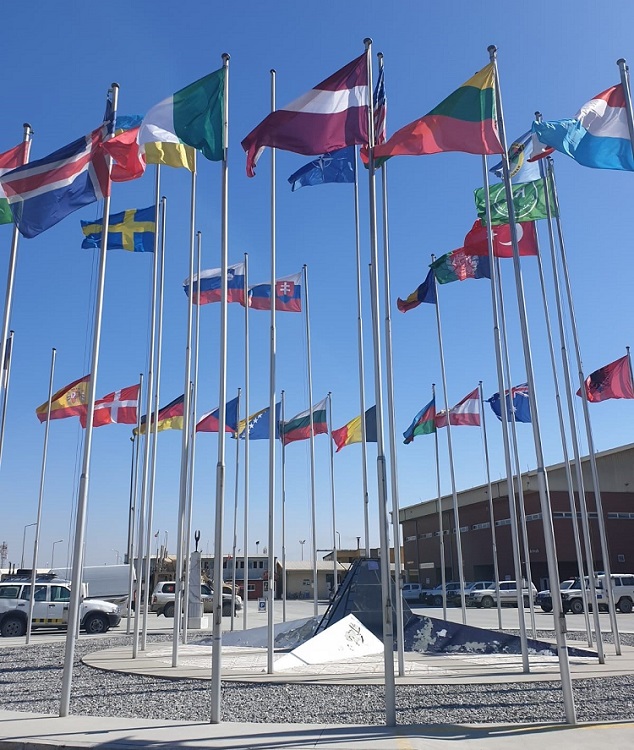
At the NATO Summit in Warsaw on July 8-9, 2016, Heads of State and Government decided to sustain the Resolute Support Mission beyond 2016, using a flexible, regional model which would continue to deliver training, advice and assistance to the Afghan security institutions, including the police, the air force, and special operations forces. They also committed to keeping the mission and its design under review.
Ahead of the meeting of NATO Leaders in Brussels on May 25, 2017, Allies and Resolute Support operational partners reaffirmed the decisions taken in Warsaw. They noted that the ANDSF are improving, whilst still requiring support; and they agreed to continue sustaining the Resolute Support Mission and to keep it under review.
At the meeting of Defence Ministers on November 9, 2017, ministers from the 39 troop contributing nations to the NATO-led Resolute Support Mission addressed four key issues: the troop level of the mission, funding for the Afghan forces, progress on reforms and reconciliation, and continued engagement with Pakistan. Allies welcomed the United States briefing on the implications of the new South Asia Strategy on the mission. NATO Secretary General Jens Stoltenberg announced that the size of Resolute Support Mission would increase from around 13,000 to around 16,000 troops in 2018.
On July 12, 2018 the Heads of State and Government of Allied and partners’ troop contributing nations to the NATO-led Resolute Support mission met within the framework of the NATO Summit held in Brussels, July 11-12, and reaffirmed their commitment to Afghanistan’s lasting security. A joint statement was issued at the end of the meeting, reaffirming the shared commitment to Afghanistan’s long-term security and stability and welcoming the progress made by the Afghan security forces and institutions. In the statement, NATO Allies and operational partners announced their commitment to: sustain the non-combat Resolute Support mission until conditions indicate a change in the mission is appropriate; extend financial sustainment of the Afghan forces through 2024; and make further progress on developing a political and practical partnership with Afghanistan, including through the Enduring Partnership. For its part, Afghanistan committed to continue its efforts towards reform, including by further strengthening its security forces and institutions, combatting corruption and organizing and holding credible, free, fair, and inclusive parliamentary and presidential elections in 2018 and 2019, respectively.
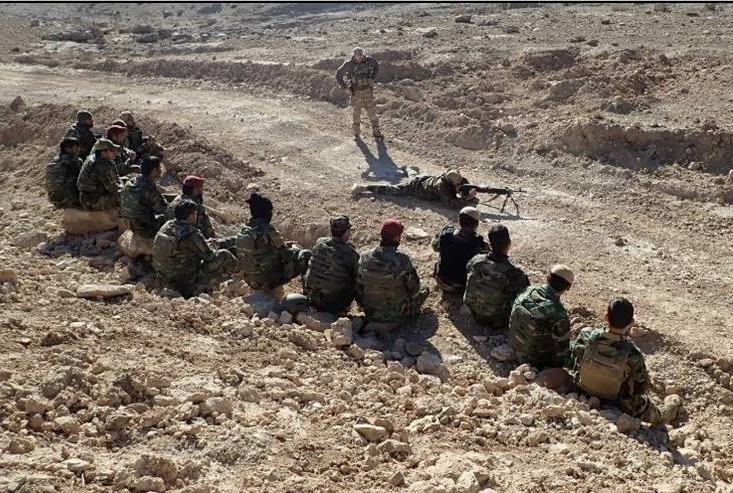
Resolute Support is a NATO-led, non-combat mission to train, advise and assist the Afghan National Defense and Security Forces (ANDSF). It was launched on 1 January 2015, following the conclusion of the previous NATO-led International Security Assistance Force (ISAF) mission, and the assumption of full security responsibility by the ANDSF. The Resolute Support Mission works closely with different elements of the Afghan Army, Police and Air Force.
The Resolute Support Mission currently comprises around 17,000 personnel from 39 NATO Allies and partners countries. It operates with one ‘hub’ (Kabul/Bagram) and four ‘spokes’ (Mazar-e-Sharif in the north, Herat in the west, Kandahar in the south, and Laghman in the east). In addition to the train, advice and assist its purpose is to help the Afghan security forces and institutions:
- Develop the capacity to defend Afghanistan.
- Protect its citizens in a sustainable manner.
Resolute Support Mission focuses primarily on training, advice and assistance activities at the security-related ministries, in the country’s institutions, and among the senior ranks of the army and police.
The mission performs supporting functions in several areas. These include:
- Operational planning.
- Budgetary development.
- Force generation process.
- Management and development of personnel.
- Logistical sustainment.
- Civilian oversight (in order to ensure the Afghan security forces and institutions act in accordance with the rule of law and good governance).
NATO is strongly committed to its mission in Afghanistan. NATO’s support to Afghanistan is focused on three main areas:
- The NATO-led Resolute Support mission to train, advise and assist the Afghan security forces and institutions.
- Funding of the Afghan security forces as part of a broader international effort.
- The NATO-Afghanistan Enduring Partnership, which is being developed jointly with the Government of Afghanistan.
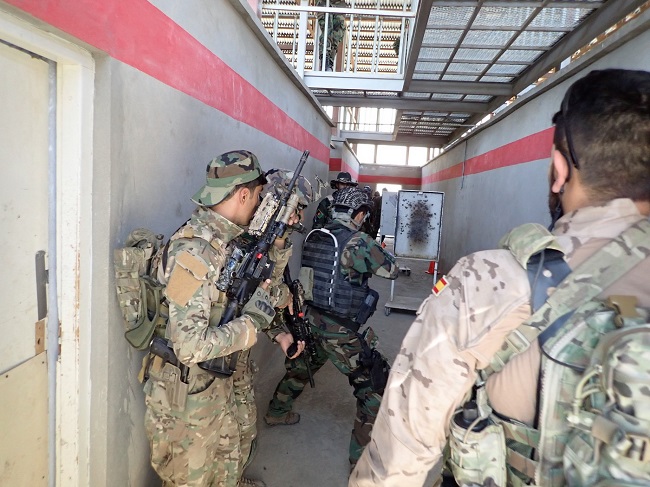
At present, the Spanish contribution to the NATO Resolute Support mission (24 military personnel and 2 national interpreters) is as follows:
- 2 servicemen in RS HQ.
- 8 servicemen NSE supporters.
- 14 military members of the Special Operations Force (SOF).
Due to the COVID-19 pandemic and, at the request of Resolute Support Mission (RSM), Spain withdrew non-essential personnel (28 military and 4 interpreters) to Spain on 30 March 2020.
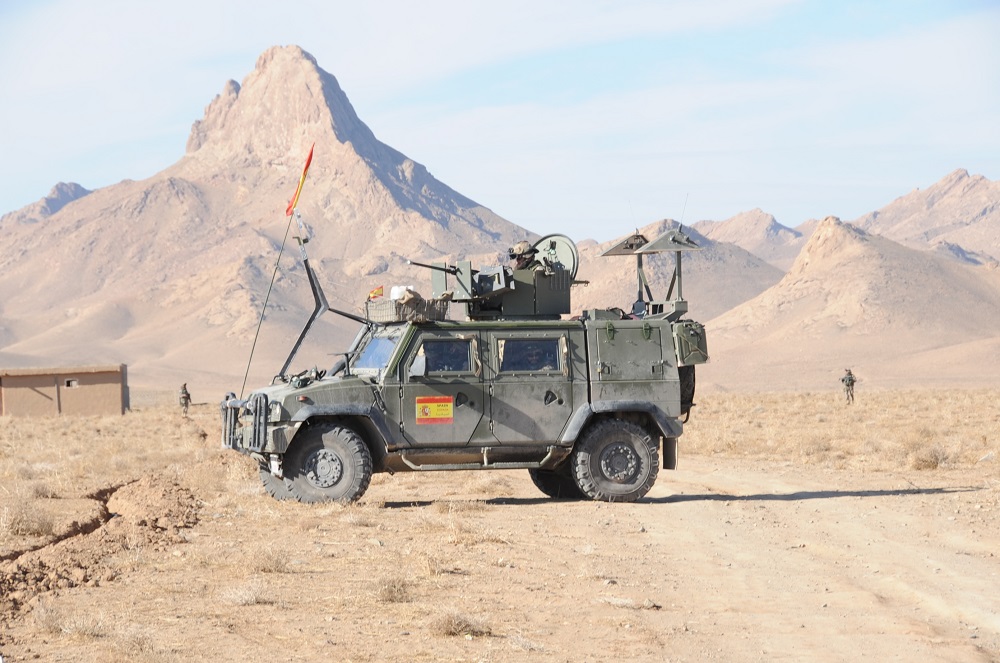
A day after the 9/11 terrorist attacks in New York and Washington, the North Atlantic Council invoked, for the first time in history, Article 5 of the North Atlantic Treaty. This Article requires the response of all members against an attack committed against one of them. This was the allied support given to Operation Enduring Freedom.
Almost unanimously, the United Nations, through the Resolution 1378/2001, called for the international community to give emergency assistance to the Afghan population.
9/11 prompted the intervention of international forces in Afghanistan. This was a country where there was no other government structure than tribal leaders, where there were no organised security forces, just militias, and where the Taliban maintained their power over an increasingly ignored and suppressed population.
International forces have worked hard to bring about peace and stability in the area. Their mission has been adapted throughout the years. Initially, their mission was to ensure security in the capital, Kabul, but lately, they expanded their presence along the whole territory to bring an end to the rebellion, to train the Afghan Security Forces and to support the reconstruction of the provincial infrastructures.
Since the beginning, Spain was involved, together with its allies, in the pacification and reconstruction of Afghanistan. During this mission, our Army Forces have conducted 28.000 patrols, have travelled three million kilometres and have conducted more than 1.400 missions detonating and disarming unexploded devices.
Initially, Spain participated in Operation Enduring Freedom contributing medical support, transport planes, ships and helicopters. However, the major contribution of our country was within the ISAF framework (International Security Assistance Force). The first 350 soldiers were sent to Kabul, and three years later Spain assumed control of the Herat base, where a field hospital Role 2E was set up, and took charge of the provincial reconstruction team in Qala-i-Naw.
On 31st December 2014, the ISAF mission was ended and the NATO Resolute Support Mission formally started. It aims to assist, train and advise Afghan institutions. A task that involves roughly 13.000 soldiers from 42 countries.
In 2018, the Spanish forces that support Headquarters in Kabul tasks of the Defence Staff also dealt with advice, training and assistance for the Afghan national logistical bodies, the Afghan Special Operations Command and the Special Operations Battalion (Kandak), and provided protection and security to the deployed staff.
The Resolute Support Mission (RSM) replaced from 1st January 2015 the NATO International Security Assistance Force (ISAF) mission in support of the Afghan Government.
This new mission is focused on training and advising Afghan forces in order to provide them with sufficient skills, which would enable them to take responsibility of their own security.
The “Resolute Support” detailed operational plan was approved by NATO at the end of June 2014.
ISAF was created by the Bonn Agreement on 22nd December 2001. The participation of Spanish troops was approved by the Council of Ministers on 27th December 2001. The contribution to Resolute Support was authorised by the Spanish Congress of Deputies on 18th December 2014.
2021
- May 13 H.M. the King Felipe VI chairs a welcoming ceremony for remaining Spanish troops in Afghanistan hosted at Torrejon AFB.
- May 13. The last spanish contingent in Afghanistan is returning home on board a Spanish Air Force A-400.
- May 12. Commander of Operation 'Resolute Support' farewells remaining Spanish troops in Afghanistan and chairs a ceremony where the Spanish Flag was lowered.
2020
- November 19th. The new head of the Spanish contingent is Col. Alfonso Álvarez Planelles.
- May 18th. The new Spanish contingent commander takes over. (Col. José Ignacio García del Olmo).
2019
- November 4th. The new Spanish contingent commander takes over. (Col. Emilio José Cortés Narváez).
- May 6th. The new Spanish contingent commander takes over. (Col. Diego M. Martínez Cañabate).
2018
- November 23. Contingent handover. Contingent Head Colonel Luis Ángel del Río Solá.
- May 28. The Special Operations Joint Command (MCOE, in Spanish), based in Retamares, (Madrid), undertakes command of the operational deployment within the framework of the NATO operation “Resolute Support” in Afghanistan.
2017
- December 28. The participation is extended till 31st December 2018, with a total of 95 forces.
2016
- Operation RSM is extended till December 2020.
2015
- December 11: terrorist attack strikes the Spanish Embassy in Kabul, in which two Spanish Policemen belonging to the security personnel of the Embassy were killed.
- October 27: the presence of the Spanish contingent at the Forward Support Base of Herat ends.
- October 25: the last flag is awarded in Herat.
- January 1: Operation Resolute Support begins.
2014
- December 31: the International Security Assistance Force (ISAF) ends.
2013
- September 25: Transfer of Ruy González de Clavijo Base.
- February 21: Bernardo de Gálvez II Base in Ludina and Rickets Base in Moqur are transfered.
2012
- November 11: Spanish troops withdrawal starts.
- November 4: Spain transfers the responsibility of the Badghis security.
- January 31: Spain compromises security to the Afghan forces in Qala-i-Naw.
- January 24: The NATO Rapid Deployable Headquarters based in Bétera (Valencia) leads the ISAF Joint Command.
2011
- July 18: NATO starts handing over security responsibilities to the Afghan forces.
2010
- July 13: opening of Ruy Gónzalez de Clavijo Base in Qala-i-Naw.
2009
- October 1: Spain takes control and management of Kabul airport.
- April 3: the ISAF contingent is extended. It includes, among its objectives, the training of the Afghan Army and Police Forces.
2008
- July 28: agreement between Spain and the Afghan government for financing and training a company from the Afghan Army and for building a confinement to barracks in Qala-i-Naw.
2007
- March 6: the ISAF and the new Afghan security forces initiate their first major joint operation against rebellion in the south of the country.
2006
- October 5: NATO expansion process is completed all over Afghanistan territory.
2005
- August 19: Spanish troops take control of the Provincial Reconstruction Team (PRT) of Qala-i-Naw.
- May 18: Spain takes command of Herat Base.
- April 1: the Spanish Field Hospital Role 2E is opened out.
2003
- August 11: NATO takes command of ISAF.
2002
- January 24: the first Spanish troops arrive in Kabul (350).
2001
- December 27: Council of Ministers allows Spanish troops to participate in ISAF.
- December 22: Bonn Agreement: Afghan Interim Authority is established.
- September 11: terrorist attacks on the Twin Towers and the Pentagon
Spanish involvement in afghanistan 2002-2021
EMAD PRESS RELEASES ON NATO's RESOLUTE SUPPORT
-
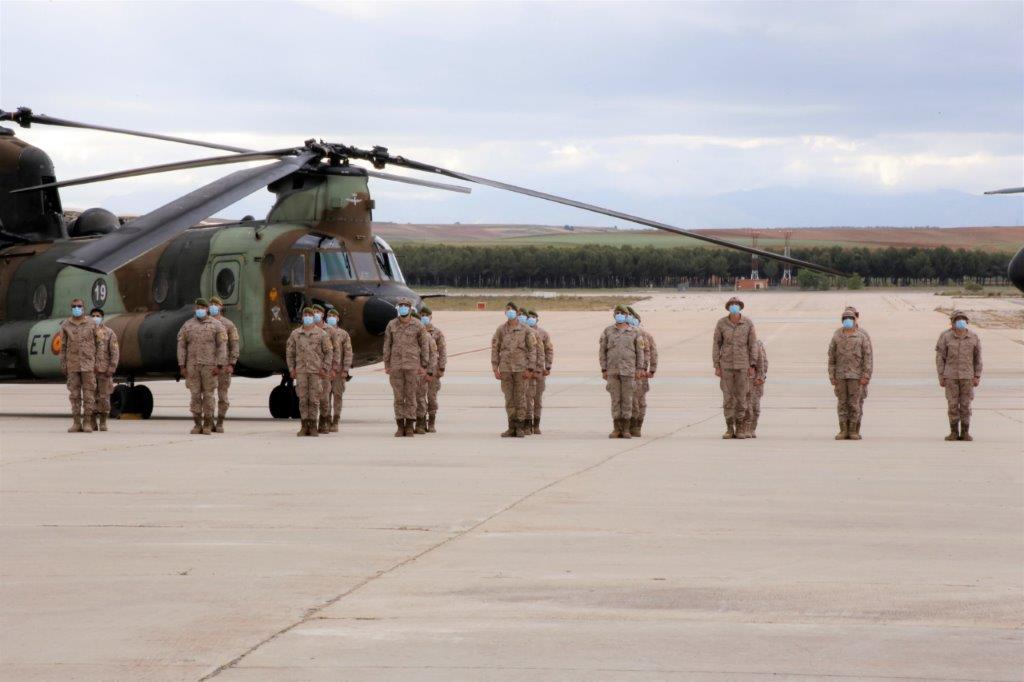
The last Spanish troops deployed in Afghanistan arrive home
The last Spanish troops deployed in Afghanistan arrive home
2021/05/13Torrejón AFB, Madrid
More information -
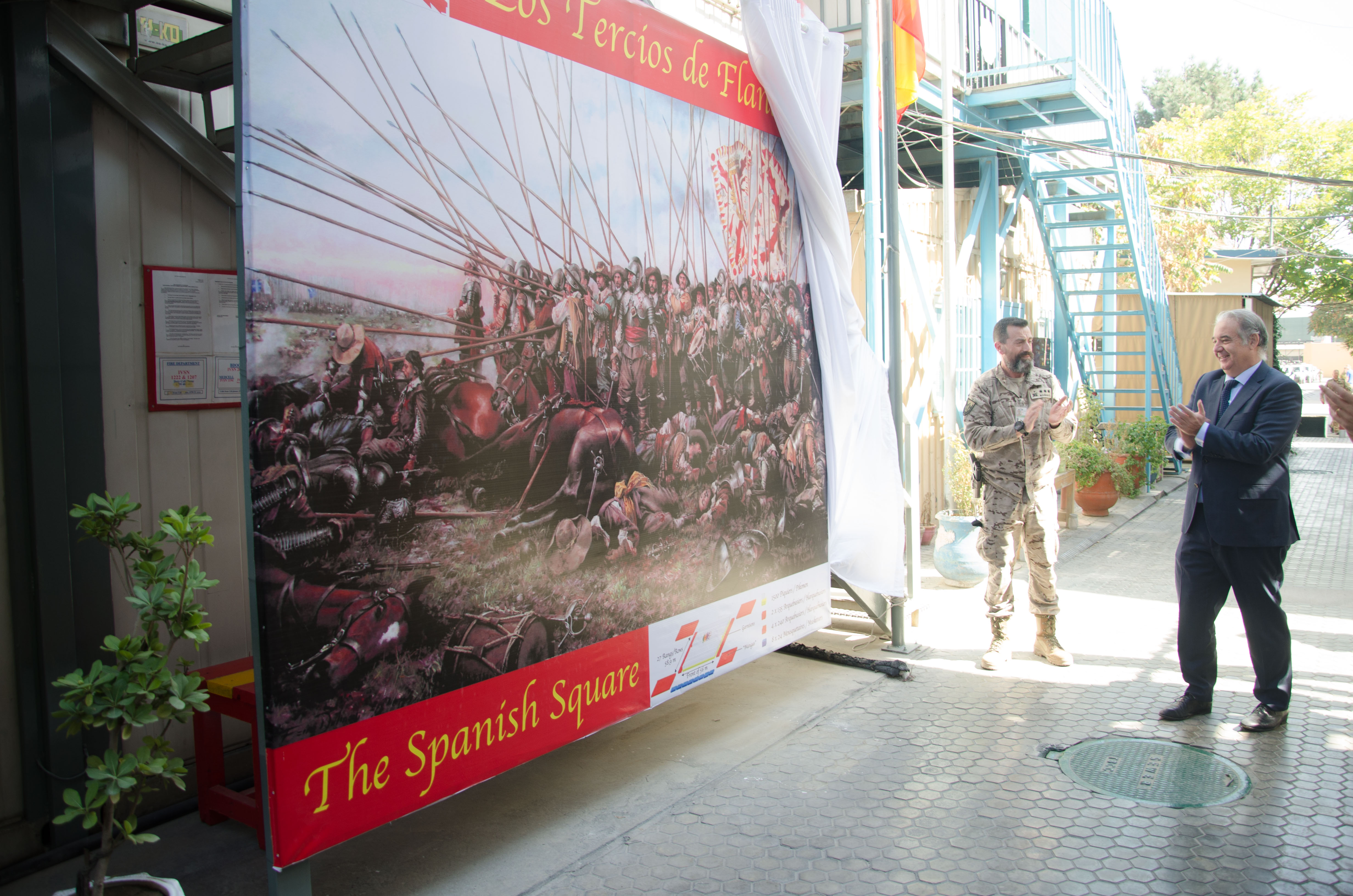
The contingent deployed in Afghanistan presents a mural inspired on the painting “Rocroi, el último Tercio”
The contingent deployed in Afghanistan presents a mural inspired on the painting “Rocroi, el último Tercio”
2019/10/14In Afghanistan
More information -
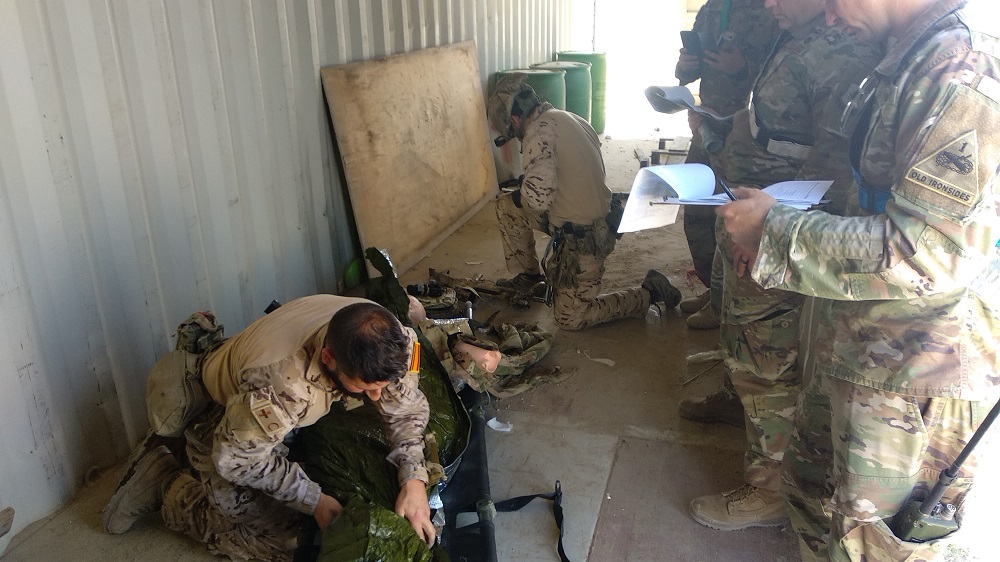
La Fuerza de Operaciones Especiales III participa en un concurso internacional de personal sanitario en Afganistán
La Fuerza de Operaciones Especiales III participa en un concurso internacional de personal sanitario en Afganistán
2019/07/26En Afganistán
More information


